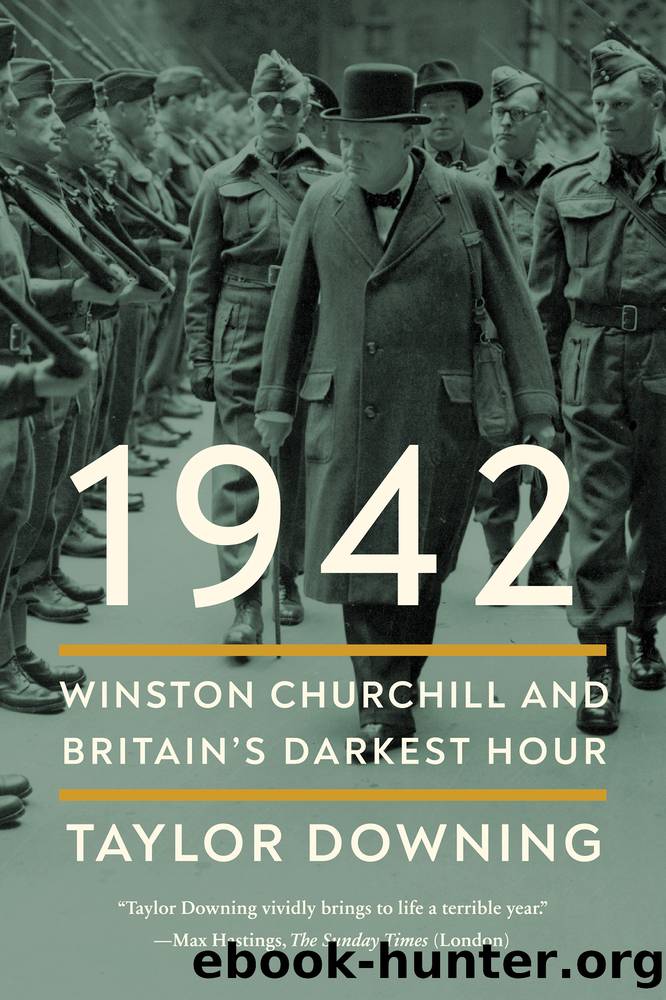1942 by Taylor Downing

Author:Taylor Downing
Language: eng
Format: epub
Publisher: Pegasus Books
Published: 2022-10-04T00:00:00+00:00
In the Libyan desert, morale among the men of the Eighth Army was good. A radio speech by the Prime Minister in early May greatly encouraged the troops. Looking back over the last two years of war, Churchill said, âWe are no longer unarmed; we are well armed. Now we are not alone; we have mighty Allies.â This went down particularly well. An Australian Army morale report concluded that âno single event in the last six months has had such a marked influence on the morale of the men as the Prime Ministerâs stirring words⦠the speech, full of fire and determination and ironic humour, has created a great feeling of confidence and satisfactionâ.15 Reinforced and now with morale restored, the desert soldiers felt a turning point had come and looked forward to the next stage in their war with Rommel and the Italians.
At the point where the two sides had stopped fighting in early February, at Gazala, the British did what they usually did in North Africa. They set about building a âlineâ that began at the sea and extended south into the desert. Up to now both armies had used the same tactics, each trying to outflank the other, heading south into the desert and then coming up behind the waiting troops. To prevent this, Ritchie ordered that his troops should form self-sufficient groups of brigade strength and build up what were called âboxesâ made up of armour, artillery and infantry which could fight off attackers from any direction. Surrounding each box, hundreds of thousands of mines were laid. The southernmost box, nearly 40 miles from the sea, was made up of Free French troops located around an old desert fort called Bir Hacheim. These boxes were intended to hold out for some time before the massed armour of the 1st and 7th Armoured Divisions could arrive to provide support and drive back the enemy.
In late April and early May, Churchill and the chiefs of staff regularly read decrypts from Bletchley Park in which Rommelâs staff were reporting the build-up of Axis forces. Churchill forwarded these to Auchinleck as âspecial informationâ. But Auchinleck held out against pressure from London and insisted he would not be ready to attack until mid-June. This time he wanted an overall 3:2 superiority in men over Rommel before launching an offensive. On 8 May the War Cabinet received more decrypts in which Rommelâs quartermaster general analysed the state of his fuel supplies and declared he had sufficient petrol for thirty-eight days of operations.16 The War Cabinet agreed that an attack was imminent and the Eighth Army must take the offensive quickly to disrupt Rommelâs plans. Churchill told Auchinleck âto attack the enemy and fight a major battle⦠the sooner the betterâ. He made it clear that London was âprepared to take full responsibilityâ for the decision.17 Still Auchinleck felt he did not have the strength to overwhelm the enemy. He delayed further.
Then, on the morning of 26 May, a British tank commander surveying the western horizon at dawn saw through his binoculars a column of dust rising into the sky.
Download
This site does not store any files on its server. We only index and link to content provided by other sites. Please contact the content providers to delete copyright contents if any and email us, we'll remove relevant links or contents immediately.
| U.K. Prime Ministers | U.S. Presidents |
Waking Up in Heaven: A True Story of Brokenness, Heaven, and Life Again by McVea Crystal & Tresniowski Alex(37020)
Empire of the Sikhs by Patwant Singh(22185)
We're Going to Need More Wine by Gabrielle Union(18086)
Hans Sturm: A Soldier's Odyssey on the Eastern Front by Gordon Williamson(16788)
Leonardo da Vinci by Walter Isaacson(11919)
The Radium Girls by Kate Moore(10917)
Educated by Tara Westover(7078)
Tools of Titans by Timothy Ferriss(6966)
How to Be a Bawse: A Guide to Conquering Life by Lilly Singh(6701)
The Last Black Unicorn by Tiffany Haddish(5081)
Permanent Record by Edward Snowden(5007)
The Rise and Fall of Senator Joe McCarthy by James Cross Giblin(4852)
Promise Me, Dad by Joe Biden(4459)
The Wind in My Hair by Masih Alinejad(4428)
The Crown by Robert Lacey(4115)
A Higher Loyalty: Truth, Lies, and Leadership by James Comey(4041)
The Iron Duke by The Iron Duke(3651)
Joan of Arc by Mary Gordon(3271)
How to be Champion: My Autobiography by Sarah Millican(3195)
